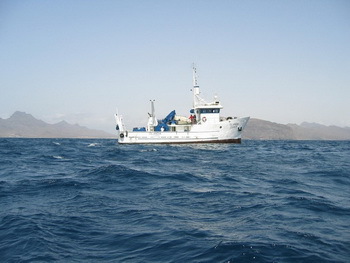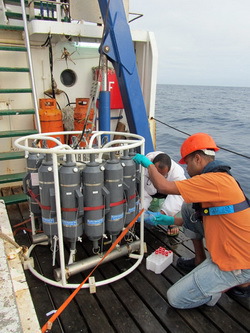Kategorie: News
Discovery leads to new relevations about the Atlantic
 |
The recent discovery of low-oxygen eddies in the tropical and subtropical Atlantic Ocean means that some assumptions about the biogeochemical cycles in this region would need to be revised.
Marine scientists from Kiel and Plön (Germany) have discovered processes within these short-lived eddies that were previously unknown in the Atlantic. These processes have an impact on, among other things, the availability of nutrients not only in the Atlantic but also the climate.
In 2010, when the Cape Verde Ocean Observatory (CVOO), north of the Cape Verdean island of São Vicente, recorded oxygen concentration levels of almost zero in the near-surface water, everyone thought that a mistake had been made. Although there are indeed low-oxygen zones at specific water depths within that region, scientists had until recently believed that almost oxygen-free conditions such as those found in the Pacific Ocean, did not exist in the Atlantic.
 |
on the RV ISLANDIA. © INDP |
However, using data from the CVOO, satellites and oceanographic buoys, scientists from Germany and Canada were able to prove that low-oxygen conditions do occur quite often in the Atlantic Ocean. They develop in eddies, which form off the coast of western Africa and occupy an area about half the size of Schleswig-Holstein (roughly several thousand square kilometres). From coastal waters, they move west through the ocean until eventually dissolving.
In early 2014, biologists and chemists of the Kiel Cluster of Excellence “The Future Ocean”, the GEOMAR Helmholtz Centre for Ocean Research Kiel, the Collaborative Research Center (Sonderforschungsbereich, SFB) 754 and the Max Planck Institute for Evolutionary Biology Plön identified another one of these eddies. They sampled it directly to learn more about the processes therein.
Publishing their findings in the international journal Biogeosciences, they revealed that they had found microorganisms in the eddy which have not been found in the Atlantic Ocean before.
“The metabolism of these microorganisms causes processes that were also previously unknown in the Atlantic,” said Dr Carolin Löscher, GEOMAR marine biologist and lead author of the study.
Among other things, the researchers were able to prove the existence of microbes that convert dissolved nitrogen compounds into pure nitrogen gas and also nitrous oxide. “So far, the Atlantic has been largely ignored as a source of nitrous oxide. We now know, however, that the low-oxygen eddies occur frequently. Therefore, we have to rethink assumptions about the nitrous oxide budget over the ocean,” said Dr Löscher.
With nitrous oxide being a powerful greenhouse gas and nitrogen being an important nutrient for plankton, the new findings will indeed have implications for assumptions about the biology of the Atlantic.
Link to the study: www.biogeosciences.net/..12-7467-2015.html
Further Information: www.geomar.de